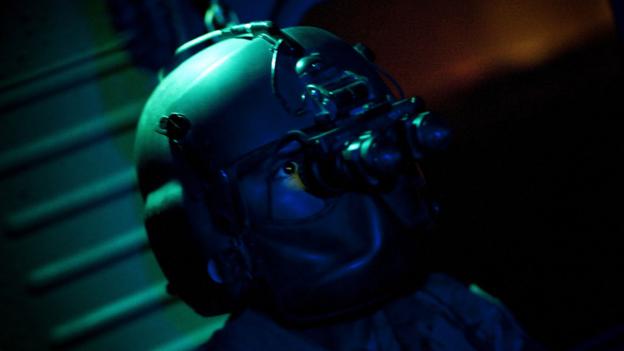
(Copyright: Getty Images)
Technology that taps into a soldier’s thought patterns could soon see action on the battlefield. But some worry about its future applications.
In Afghanistan, some soldiers are said to possess a sixth sense.
They hone their skills at the head of convoys that trundle along the dusty roads of remote mountainous provinces. As they drive, these soldiers scan ahead for signs of roadside bombs: disturbed earth, a glint of metal, or just something that seems out of place. Spotting them can mean the difference between life and death. Those who are half-jokingly said to possess the “sixth sense” are the ones that seem to have an uncanny ability to spot these almost imperceptible signs of danger.
Now, military scientists are beginning to build technologies that would give every soldier this ability, pushing the field of neuroscience from the lab and on to the battlefield.
These devices exploit what neuroscientists call the P300, a wave of brain activity that signifies an unconscious recognition of a visual object, and is so-named because it occurred about 300 milliseconds after stimulation. The P300 can be thought of as the biological basis of the sixth sense.
The problem is that it may take several seconds for the brain to become conscious of what it’s seen, and in Afghanistan, that brief time can mean the difference between spotting a bomb, and driving over it and setting it off.
But a device known as an electroencephalogram (EEG) can spot that P300 signal. Hooked into a sophisticated computer that can interpret the signal, it can immediately alert a person to a potential threat, taking a short cut through the brain’s normal conscious processing. Combined with advanced optics, it is possible to imagine a Terminator-like vision system that scans an area and immediately identifies and categorises threats.
Although it sounds far-fetched, this is roughly the idea behind a new military technology called Sentinel (SystEm for Notification of Threats Inspired by Neurally Enabled Learning), which is being touted as the world’s first “cognitive-neural” binocular threat-warning system.
Brain Game
Here’s how it works in practice: a high-tech camera scans a wide field of view, and then picks out potential threats based on sophisticated algorithms that mimic the human vision system. Then images of those threats are flashed in rapid succession through a viewer to the user, whose brain signals are being monitored. When the brain spots a potential threat and gives off the P300, the signal is detected and the user is visually alerted to focus on that specific image.
“That’s the beauty of this approach, it’s the human brain doing the filtering,” says Dr. Deepak Khosla, the chief scientist for the project at HRL Laboratories, based in Malibu, California, which developed the goggles under a research project funded by the Pentagon’s Defense Advanced Research Projects Agency (Darpa).
It may sound harder than just using a plain old pair of binoculars, but the ability to go through many images without manually scanning the landscape, or having to click through camera images, does save time, at least in tests. Sentinel has already outperformed conventional binoculars by spotting 30% more simulated threats in tests conducted in a desert environment in Arizona and tropical terrain in Hawaii, according to the company, and this summer the Army will field-test a prototype of the binoculars at Camp Roberts in California.
These goggles represent more than just another gadget: they could well become the first example of military neuro-enhancement using what is called a brain-machine interface.
The potential impact of such technology, long the stuff of science fiction, has emerged in recent years as a subject for serious military experts. In fact, a 2008 report on neuro-enhancement by the Jasons, a group of elite scientists who advise the government on national security issues, warned of the “potential for abuses in carrying out such research, as well as serious concerns about where remediation leaves off and changing natural humanity begins.” While the US military would be less prone to abuses thanks to extensive laws and regulations, “the activities of adversarial forces, will not likely be similarly constrained,” they wrote.
To read the rest of this story, visit http://www.bbc.com/future/story/20120704-mind-control-moves-into-battle/1

